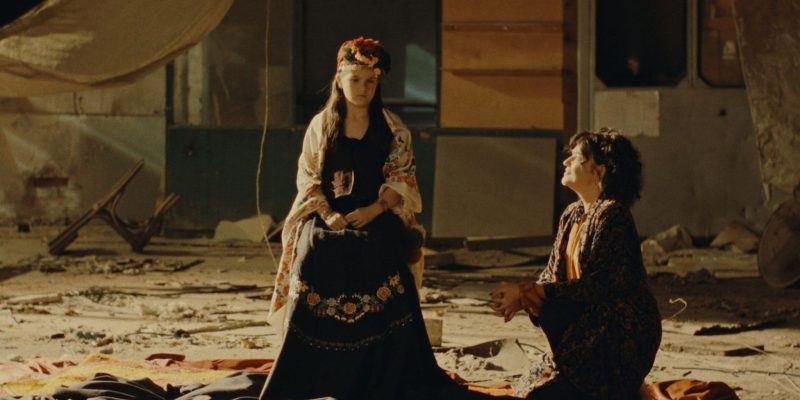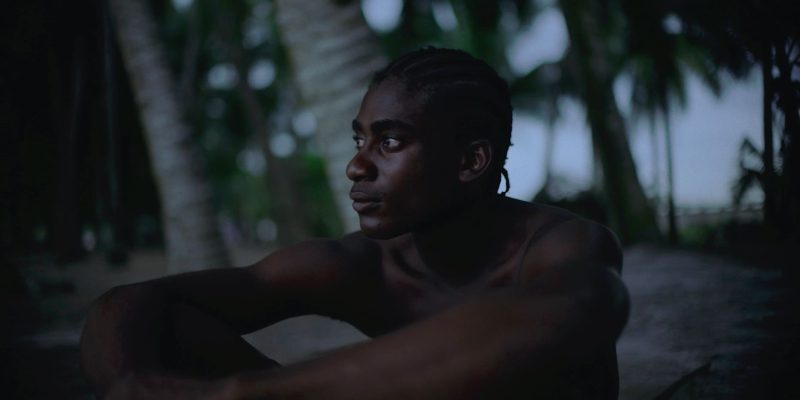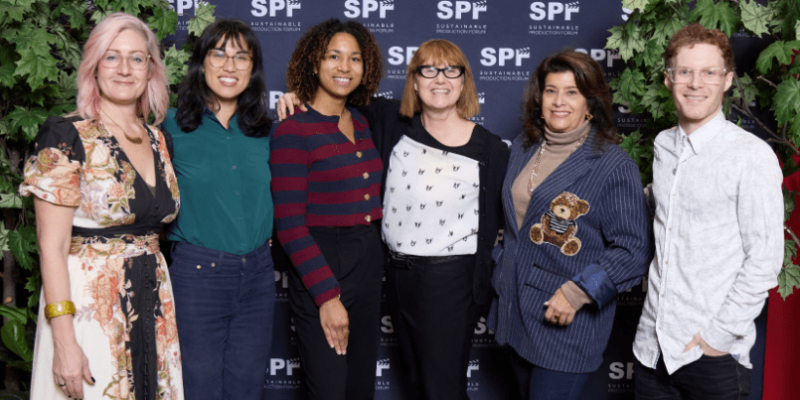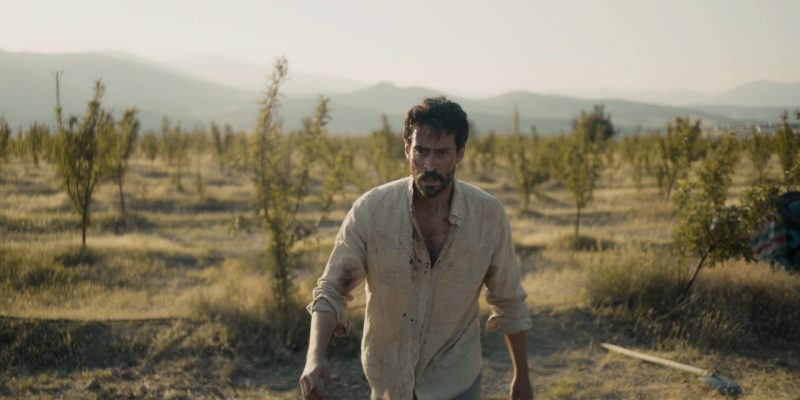Falena, the debut short film by Nancy Pettinicchio, manages to capture that curious — at times wistful — feeling of summers in your youth coming to a close. It follows Leila (Nahéma Ricci), a young woman about to move away from her suburban hometown, leaving behind her closest friend Cassy (Chanel Mings). One afternoon, Leila stops at a yard sale held by Annette (Nathalie Gascon), an older woman who Leila finds a nude photograph of in the items for sale.
This discovery leads to Leila exploring photography — and nude portraiture — by herself, and is the catalyst for Leila to spend more time with Annette before moving away, complicating things with Cassy.
“The relationship between Leila and Cassy was the trickiest part of the film for me,” says Pettinicchio. “I wanted to explore the ambiguous type of intimacy in close relationships during early adulthood, especially amongst young women and queer folks. Leila and Cassy are best friends, but there’s a certain level of romance that factors into a long-lasting friendship, in my experience: wanting to live new things together, to witness each other’s growth, to be a part of every important step in each other’s lives. I think my relationship with my best friend growing up was one of the strongest loves I will ever experience.”
“At some point, when you reach an age where you want to pursue new things — in Leila’s case, moving out of the suburbs, away from her parents’ home — your goals don’t always align with those of your friends. And sometimes, this is one of the first instances of your paths splitting: it’s an expected yet emotional part of growing up, and it feels in some ways like a breakup that you pretend is not really happening. There is a sense of abandonment on Cassy’s end; she feels like she’s not enough for Leila anymore. And, of course, Leila’s infatuation with Annette just adds to Cassy’s insecurity. Jealousy is certainly at play here, but whether it comes from a place of friendship or romance is unclear. I’m not sure Cassy can even distinguish that for herself; I know that I sure couldn’t make the distinction at that time in my life. I only really put my finger on how I was playing with this romantic ambiguity when I was directing on set. A few days after we wrapped the shoot, I came out as queer, and things suddenly made a lot more sense to me — both in terms of the characters in the film and my own identity.”
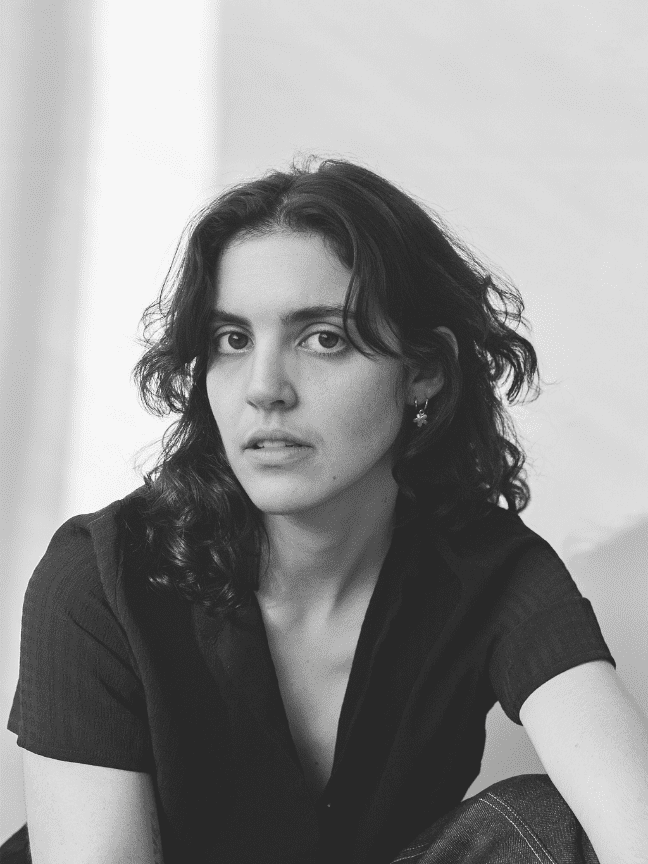
I wanted to explore the ambiguous type of intimacy in close relationships during early adulthood, especially amongst young women and queer folks.
Falena’s setting of summertime in the suburbs recalls Stéphane Lafleur’s 2014 coming-of-age feature Tu dors Nicole, which Pettinicchio cites as an influence (and a favourite film).
“Tu dors Nicole has this way of presenting summer in the suburbs in early adulthood as a time and place where you don’t really know what to do with yourself,” she says. “You have all of these ideas and ambitions for how things can go, but they never really go as planned… I wrote the first treatment for this film on the night I moved into my first apartment in Montreal in October 2017. I wanted to explore something personal, and I was right in the middle of experiencing this transition between my suburban summer and my newfound independence in the city. Moving out was a first step towards figuring out my own identity, and I had been eager to take that step for years.”
Leila spends these dwindling summer moments with Cassy, riding bikes, going to the carnival , and trying to play Nintendo 64. But her mind is clearly elsewhere, thinking of Annette, of what’s next in her life, and of her own self-perception. Indeed, Falena has a mirror motif of reflection, both literal and figurative.
“I wanted [Leila] to look at herself with curiosity rather than judgement,” says Pettinicchio. “When she starts to explore photography, and self-portraiture more specifically, she discovers this tool through which she can explore her identity. Leila sees herself through her own lens; she has agency over her own image, and she’s playing with self-representation. And in a way, I’m playing with self-representation. It’s a cliché in coming-of-age films for young women to dislike what they see in the mirror — I really didn’t want that for Leila. When she finds the nude self-portrait of a young Annette at the yard sale, she doesn’t see something sexual or scandalous. I see nudity as a way for Leila to come face to face with herself in the most intimate way possible, despite how intimidating that feels.”
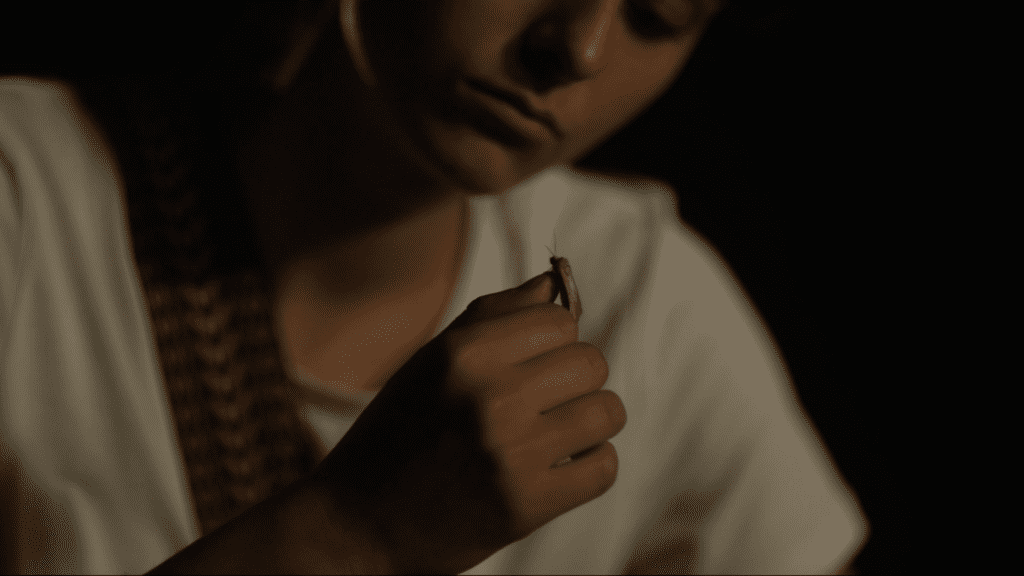
“Throughout the film, Leila reckons with everything she is leaving behind by moving away — her room, her neighbourhood, her best friend, and all of the rituals they’ve created and practiced together for years,” she adds. “Photography is her means of capturing a moment in time, and her means of capturing herself in that moment in time. Annette’s photo serves as a reminder of the past, as a look at who Annette was when she was Leila’s age… It inspires Leila to try and put her finger on who she is now and how a photo may represent that in the future. When she finally presses down on the shutter release and takes her self-portrait before leaving her bedroom on moving day, it’s as if she can finally move forward from this chapter of her life, and begin a process of self-exploration that may lead her to soon capture a very different version of herself.”
When Leila does finally pack her car and say goodbye to Cassy, Pettinicchio leaves us with a closing shot that’s quietly disarming: We see the back seat of Leila’s car full of the things that are coming with her; in the rear window, as Leila drives forward, we see the life she’s leaving behind.
“The script initially included a final scene where Leila unpacks her car into her new apartment in the city and sits down on the front steps, taking in her new neighbourhood,” says the director. “Even though we shot this scene, it just didn’t feel like it belonged in the film. In the end, I decided I didn’t want us to be taken out of the suburban environment. The final shot, where we’re looking out of the rear window of Leila’s car, provides an opportunity to imagine endless possibilities for Leila’s future outside of her hometown. I don’t think it really matters where she’s going: she just knows it’s time to go.”
Falena is one of seven shorts in the Not Short on Talent programme at Clermont-Ferrand 2022. Pettinicchio’s next project, a documentary podcast in post-production, features speakers sharing their relationships with their bodies — and how those relationships intersect with different parts of their identities — throughout shifts or moments of transition; she’s also developing another fiction short that delves deeper into the theme(s) of close friendship and romance.

JAKE HOWELL
Jake Howell is a Toronto-based writer and freelance film programmer.


